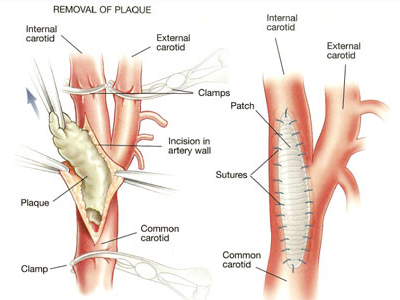This surgery is recommended when the Internal Carotid Artery, one of the four blood vessels supplying blood to the brain, is shown to be narrowed more than 70% and the patient has experienced symptoms of a stroke( a brain attack) in some form. The surgery involves a small incision over the side of the neck.
Removing the plaque (the fatty material causing the narrowing)from within the artery surgically, restores the normal flow of blood through the artery and minimizes the risk of any loose particles in the plaque getting dislodged and traveling to the brain to cause a stroke in future.
I routinely perform this surgery under local anesthesia, which is administered by a highly skilled anesthetist who is experienced in being a team member in this type of surgery. General anesthesia is only administered in exceptional cases.
Like any surgery, there are some risks, albeit rare, while performing this surgery. These might be cranial nerve injury (leading to temporary voice changes and deviation of tongue) and intra operative stroke. The incidence of such complications is very low (less than 2%) in experienced hands. I routinely use a shunt to maintain blood supply to the brain even during the period of surgery when the artery is being cleaned and sutured.
Usually 3-4 days stay is all that is required for this surgery.
No.If the narrowing in the internal carotid artery is greater than 70%,the NASCET and ECST trail, both large and authentic trials in the US and Europe, have shown a significant benefit from surgery over medications in terms of protection from getting a major stroke.
Other than for patients who have a very short neck or a history of previous surgery in the neck, where surgery could be difficult, and in patients with a high cardiac risk, the CREST trial, a large trial comparing surgery vs stenting has not shown stenting to be superior to surgery. In fact, the risks of getting a stroke on the table during stenting are higher.
Yes. Carotid Endarterectomy costs at least one fourth the price of stenting with a cerebralprotection device.
A vascular surgeon, a neurologist specializing in stroke, an anesthetist who is experienced in this type of surgery, an intensive care specialist and a neuro-rehabilitation specialist will be part of the team that will look after all aspects of patient care during your hospitalization.


